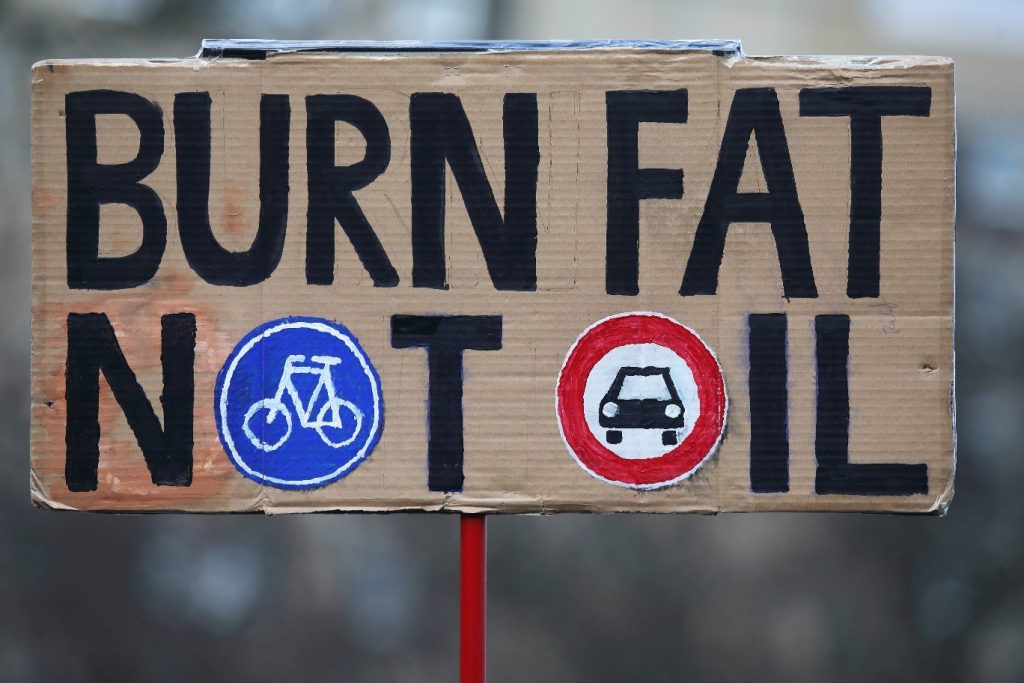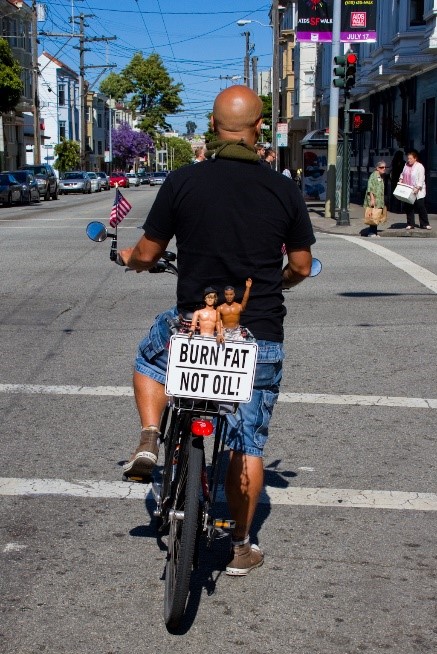Three years ago, in August 2018, Greta Thunberg and other young climate activists gained international recognition when they missed school for three weeks to protest in front of the Swedish parliament, demanding a noticeable increase in political action to prevent climate change. While U.S. climate activism and its countermovement started to gain traction in the 1990s, the more recent protests in Sweden have inspired many people across the globe to follow suit, forming the Fridays for Future (FFF) movement. However, a rhetoric of anti-fatness and ableism threatens to undermine the movement’s attempt to engage a diverse group of people in its cause.
With this blog post, I want to challenge the use of popular slogans like “BURN FAT, NOT OIL,” that are part of a larger rhetoric of anti-fatness used among climate change activists (and others). In line with fat disability studies scholar Anna Mollow, I argue that anti-fatness is closely linked to ableism and is yet also distinct from it. While fatness has become increasingly stigmatized as one of the causes of climate change, disability is primarily considered a potential consequence thereof—a framing that consequently suggests that neither fat nor disabled people truly belong within environmental activism.


As a quick online search reveals, supposedly catchy phrases like “BURN FAT, NOT OIL,” that are meant to encourage people to ride bikes instead of cars, can be found on protest signs, t-shirts, and other items. The two images shown here—one taken during a 2020 FFF protest in Berlin (Fig. 1), the other shot in San Francisco in 2011 (Fig. 2)—illustrate that the phrase, while preceding the first FFF protests, has been quickly picked up by its participants and popularized outside of the U.S. and other English-speaking countries. The slogan is based on two underlying assumptions, namely that 1) losing fat is necessarily desirable and 2) individual means of transportation are up to one’s choice / accessible to all. The slogan thus perpetuates the idea that environmentalists in general and climate change activists in particular do not only make the right decisions for the planet but also for themselves and their bodies. However, from an intersectional viewpoint, widespread associations of climate change activism with slim and physically active bodies are problematic as they foster exclusion on several levels. After all, there are privileges involved in meeting these bodily norms that are related to class and subsequently also to whiteness. Moreover, such slogans easily risk reinforcing the false equation that to be fat or disabled automatically means to be unhealthy.
To be clear, anti-fat sentiments are not just a result of an unfortunately picked slogan by protesters. Instead, anti-fatness is deeply ingrained in discourses about climate change and is, among other places, promoted within scientific discussions concerning global warming. Bestselling books like The Energy Glut: The Politics of Fatness in an Overheating World and Planet Obesity: How We’re Eating Ourselves and the Planet to Death, in which public health scholars introduce their findings to a broader public, are based on the ableist assumption that a “better future” for us and our planet is necessarily marked by slim and healthy bodies.
A closer look at Ian Roberts’ The Energy Glut is helpful to address the problematic and yet complex ways in which climate change and fatness have been related. While the book speaks up against the shaming of individual bodies (10-25), its overall rhetoric, starting with its very title, enforces the idea that a fattening population must be avoided at all costs. Unlike the other publications I mention here, though, The Energy Glut neither focuses on individual food consumption nor the food industry at large. Strikingly enough, significant parts of its analysis aren’t directly concerned with fatness at all but primarily focus on the oil and car industry. That the book, nevertheless, places one of its focal points on fatness speaks to the prevalence of anti-fatness within scholarly discourses on climate change. By automatically linking a lack of physical movement to fatness, the actual causes of climate change are replaced by images of fat bodies that come to serve as a quick stand-in for excess and inaction.
Even years after the 2010 publication of The Energy Glut and Planet Obesity, succeeding studies make for sensational headlines in newspapers and magazines. In a 2019 article, for instance, the science editor of The Times tells his readers that “If you can’t stay slim for yourself, maybe you should lose weight for the planet,” explaining further that due to increased food consumption and “added burden” for transport “obese people are each responsible for more than a tonne of extra carbon dioxide emissions a year.” With fat people becoming scapegoats, the responsibility for climate change is placed on the individual to either lose or avoid gaining weight. At the same time, such articles divert public attention from systemic causes of climate change, e.g., the political impact the petroleum industry continues to hold, the unequal distribution and waste of food, etc.
Although the claim that “Fatties Cause Climate Change” has been refuted by scholars, the underlying idea that fatness and environmentalism do not go well together seems to persist. In fact, a 2019 Lancet Commission report promotes the idea that more radical action must be taken against fatness to save the planet. The 43-member commission asks medical, political, and social leaders to no longer think of the so called “obesity pandemic” in isolation but to “address obesity within the context of The Global Syndemic [of obesity, undernutrition, and climate change], which represents the paramount health challenge for humans, the environment, and our planet in the 21st century” (791). Throughout the report, however, fatness becomes not one but the main parameter to control current and future numbers of deaths and “disability-adjusted life years” (801). Yet, while its authors repeatedly stress that “obesity” contributes to global “loss in health” both directly (accounting for diabetes and other chronic illnesses) and indirectly (as a catalyst of climate change), the report falls short of including essential factors like access to affordable healthcare in its analysis (e.g., the fatal consequences of the insulin crisis in the U.S.).
Although fatness and disability are closely intertwined in the literature I have presented so far, it seems important to note that within climate change discourses both categories are used in distinct ways. While fatness is made out to be one of the causes of climate change, disability is merely included as a symptom, a potential risk resulting from both climate change and/or fatness. What books like The Energy Glut miss to acknowledge is the omnipresence of disability as a common part of human life. As the Lancet Commission rightly proposes, “[t]he engagement of people, communities, and diverse groups is crucial for achieving [environmentalist] changes” (792). If taken seriously, however, this means that, for real change to occur, disabled as well as fat people must be considered as part of an existing community instead of serving as the simple means of a dystopian warning in an ableist imaginary. Put differently, to truly include fat and disabled people as potential allies in the same cause, their existence outside a simple cause-and-effect framework must be acknowledged.
Otherwise, both disabled and fat people fall victim to what Anna Mollow and Robert McRuer have identified as “a distinctively neoliberal prejudice,” namely the assumption “that bodies, like commodities produced in a factory, should, as the result of carefully rationalized inputs and outputs, take on predictable, normative morphological forms” (44). Within this logic, only bodies that (supposedly) are and can be controlled make for good activist material, while unruly bodies are quickly related to a lack of effort or, more simply speaking, to laziness. In a society that excessively promotes means of controlling one’s body, accusations that regard laziness are widespread and affect fat and disabled people alike, although in different ways. This becomes clear whenever people are encouraged to lose weight by riding their bikes for environmentalist purposes (as if there were no fat cyclists and/or environmentalists). At the same time, those among us are forgotten who, due to disability, cannot simply skip their cars in favor of riding a bike. Despite their well-meaning intentions, environmentalist spaces thus become unwelcoming to those whose bodies are indirectly scrutinized by slogans like “BURN FAT, NOT OIL.” By invoking fat and disabled bodies as that which is to be avoided, climate change activism risks falling into a neoliberalist logic that values people according to a simple cost-effectiveness scheme and excludes fat and disabled people from what should be a common cause.
To discuss “harm without harming,” as Thomas Bretz so aptly demands in his analysis of environmental justice (169), we need to address inequalities that are fostered within the environmental movement. In recent years, the term “eco-ableism” has been introduced in disability scholarship and activism to denote various types of discrimination against disabled people that are practiced within environmentalist circles, often unknowingly so. As stated above, the prevalent use of anti-fat rhetoric within environmentalist discourse is closely related to such eco-ableist practices. Because of its distinct features, though, I propose that anti-fatness within environmentalism needs to be addressed separately before it can be analyzed in the context of body politics more generally. Therefore, inspired by disability studies, let me put forward “eco-fatmisia” as a term that may be helpful to address and scrutinize the various forms of anti-fatness that can be found within environmentalist discourse. By analyzing eco-ableism and eco-fatmisia as two distinct currents that follow the same logic, joined scholarship in disability studies and fat studies holds the potential to disrupt some of the normative beliefs that currently keep environmentalism at large and climate activism in particular from becoming a more inclusive movement.
Disclaimer: I have written this text primarily as an American Studies scholar specialized in Disability Studies; however, my thoughts on the matter presented here stem as much from my work as a scholar as they are shaped by my political engagement as a proponent of environmentalist policies and a member of Germany’s green party. I am making this transparent since I am aware that any critique of Fridays for Future or related movements easily bears the risk of being used by opponents to delegitimize environmentalist calls to action. This blog entry is not meant to enforce such anti-environmentalist sentiments—quite to the contrary. The recent floods in western Germany and their devastating consequences are just the latest testament to the immense threat that climate change poses–a threat that, paired with ableism, becomes even more dangerous for some. This text is dedicated to the memory of the 12 disabled people that died a cruel death on July 15, 2021, because of a failure to evacuate them from their group home in time.